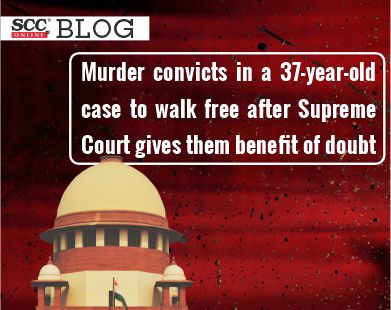Supreme Court: In two criminal appeals filed against the judgment and order passed by the Allahabad High Court, wherein the Court had dismissed the criminal appeal filed by the appellants/convicts from the judgment and order of the Trial Court, wherein the Court has convicted and sentenced them to life imprisonment, the division bench of S. Ravindra Bhat and Dipankar Datta*, JJ. held that the charge that the convicts had committed murder, was not proved beyond reasonable doubt; hence, they were and are entitled to the benefit of doubt. Thus, the Trial Court's judgment of conviction and order of sentence being unsustainable, was set aside; consequently, the impugned judgment and order passed by the High Court, upholding the conviction and sentence, too was set aside
In the case at hand, the four accused persons were convicted for the offence of murder, wherein the Sessions Judge had held that the consistent and unimpeachable direct evidence proved the case, which was supported by dependable probabilities, existence of motive, medical evidence and all other circumstances. The High Court concurred with the findings returned by the Sessions Judge and observed that there was no sufficient ground to interfere upon completion of investigation.
The issue in this case was, whether the Trial Court, based on the materials before it, was justified in recording conviction and consequently, sentencing the convicts to spend the rest of their lives in prison.
The Court took note of certain principles:
-
Section 134 of Indian Evidence Act, 1872, enshrines the well-recognized maxim that evidence has to be weighed and not counted. In other words, it is the quality of evidence that matters and not the quantity.
-
Oral testimony may be classified into three categories, viz.:
-
Wholly reliable;
-
Wholly unreliable;
-
Neither wholly reliable nor wholly unreliable.
The first two categories of cases may not pose serious difficulty for the Court in arriving at its conclusions. However, in the third category of cases, the court must circumspect and look for corroboration of any material particulars by reliable testimony, direct or circumstantial, as a requirement of the rule of prudence.
-
A defective investigation is not always fatal to the prosecution where ocular testimony is found credible and cogent.
-
Non-examination of the Investigating Officer must result in prejudice to the accused; if no prejudice is caused, mere non-examination would not render the prosecution case fatal.
-
Discrepancies do creep in, when a witness deposes in a natural manner after lapse of some time, and if such discrepancies are comparatively of a minor nature and do not go to the root of the prosecution story, then the same may not be given undue importance.
The Court noted that there was a long-standing quarrel during the last ten years between the parties.
The Court viewed that the oral testimony of the two witnesses was not free from doubt and their evidence not being of unimpeachable quality, the rule of prudence would demand a corroboration of their versions from other witnesses who, according to them, were present at the place of occurrence and witnessed the murder of the victim.
The Court said that the statement of one witness under Section 161 of the Code of Criminal Procedure, 1973 (‘CrPC') was recorded nearly 24 days after the incident. Since the Investigating Officer did not enter the witness box, the convicts did not have the occasion to cross-examine him and thereby elicit the reason for such delay. Consequently, the delay in recording the statement this witness in course of investigation, is not referred to and, therefore, remains unjustified. The possibility of this witness being fixed up as an eye-witness later during the process of investigation cannot be totally ruled out.
Thus, it held that as there are conspicuous gaps in the prosecution case and the evidence of the two witnesses not being wholly reliable, the present case, is one where examination of the Investigating Officer was vital since he could have adduced the expected evidence. His non-examination creates a material lacuna in the effort of the prosecution to nail the convicts, thereby creating reasonable doubt in the prosecution case.
Further, it said that the failure/neglect to seize the weapons of offence has the effect of denting the prosecution story, and this, together with non-examination of material witnesses constitutes a vital circumstance amongst others for granting the convicts the benefit of doubt.
The Court said that mere defects in the investigative process by itself cannot constitute ground for acquittal, it is the legal obligation of the Court to examine carefully in each case the prosecution evidence de hors the lapses committed by the Investigating Officer to find out whether the evidence brought on record is at all reliable and whether such lapses affect the object of finding out the truth. Thus, the Court examined the evidence led by the prosecution threadbare and refrained from giving primacy to the negligence of the Investigating Officer as well as to the omission or lapses resulting from the perfunctory investigation undertaken by him.
The Court also said that there is a fair degree of uncertainty in the prosecution story and the Courts below were seemed to be influenced by the oral testimony of the said two witnesses, without taking into consideration the effect of the other attending circumstances. Thus, the Court set aside the Trial Court and High Court's judgment and order and acquitted the convicts.
[Munna Lal v. State of U.P., 2023 SCC OnLine SC 80, decided on 24-01-2023]
*Judgment by: Justice Dipankar Datta
Advocates who appeared in this case:
For Appellant: Advocate-On-Record Mukesh K. Giri
For Respondent: Advocate-On-Record Ankur Prakash, Advocate-On-Record Sanjay Kumar Tyagi, Advocate Vikas Bansal, Advocate Prabhat Kumar Rai, Advocate Sanjay Kumar, Advocate Pawan, Advocate Memansak Bhardwaj
*Apoorva Goel, Editorial Assistant has reported this brief.






